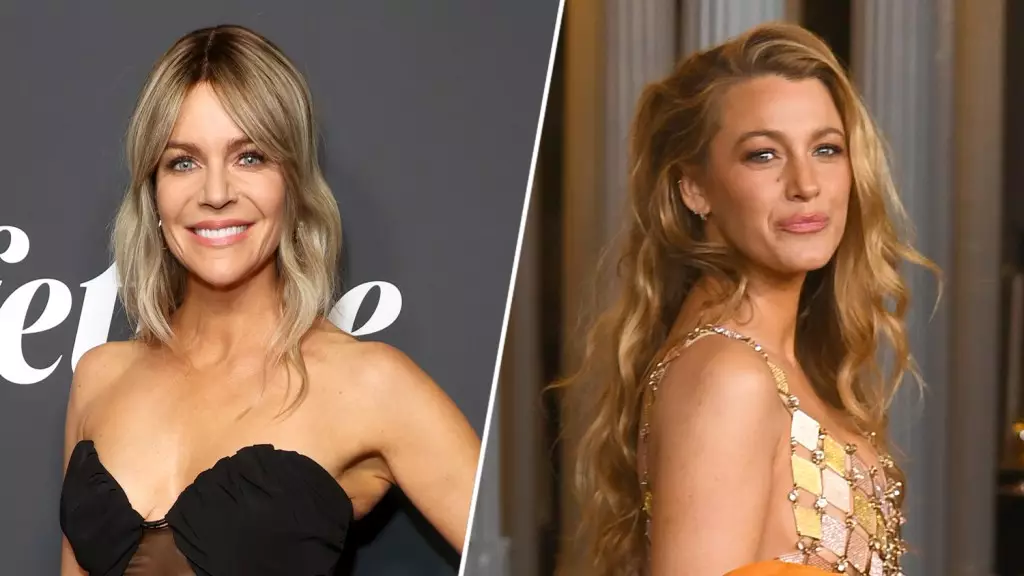The entertainment industry has long been a hotbed for issues surrounding power dynamics, gender inequality, and allegations of misconduct. Recently, the public found itself thrust into a high-profile controversy involving actress Blake Lively and “It Ends with Us” director Justin Baldoni. Allegations made by Lively, claiming sexual harassment and retaliation, have led to substantial public discourse encompassing not only the individuals involved but also the broader implications for the industry itself. A chorus of support for Lively, highlighted by her peers, underscores the growing awareness and desire for accountability in Hollywood.
Following the release of her allegations, several prominent figures have rallied around Blake Lively, one notable supporter being Kaitlin Olson. By labeling Lively as “a kind, lovely, honest and generous person” on social media, Olson not only lends her voice to Lively but also reinforces a crucial narrative about the importance of solidarity among women in the industry. This demonstrates an emerging collective stance against harassment and maltreatment, as well as an increasing willingness for people in Hollywood to publicly counteract what they perceive as wrongdoing.
Support from colleagues amplifies the message that survivors of misconduct should be believed and validated, fostering a more hospitable climate for individuals who dare to come forward. Olson’s public endorsement not only elevates Lively’s claims but may encourage others who have experienced similar traumas to share their stories without fear of repercussion. Such solidarity illustrates the changing landscape of Hollywood, where speaking out against malfeasance can be less perilous with a network of support.
Lively’s allegations include claims against Baldoni and his production company, Wayfarer Studios, accusing them of enforcing a “hostile work environment.” The detailed 80-page complaint reveals the lengths to which Baldoni allegedly went to retaliate against Lively for her outspoken stances. This makes the case essential to examine, as it not only highlights the alleged actions of Baldoni but suggests a systemic issue within Hollywood regarding how those in power manage dissent.
One of the most alarming elements of the complaint entails the description of a calculated “Astroturfing” campaign aimed at discrediting Lively. The use of this term, which refers to manufactured grassroots advocacy, sheds light on the lengths to which Baldoni and associates purportedly went to manipulate public perception of the situation. Such tactics, if true, suggest that the media machine can perpetuate false narratives and silence dissenters, a practice that undermines ethical standards in Hollywood and perpetuates cultures of silence.
Blake Lively’s case also illustrates a larger threshold of accountability that the entertainment industry must confront. As she articulated, her legal action aims not merely at personal vindication but also at raising awareness about the pervasive culture of harassment and intimidation. The hope is that her case will act as a catalyst for broader reforms—protecting future victims and reshaping industry standards.
The allegations have sparked a debate about the effectiveness of current retaliatory tactics and whether such pressure can be sustained when supported by a stronger, vocal community. As reflected in Lively’s statement, shining a light on these insidious practices is crucial for fostering an environment where artists and entertainers can work without fear of repercussion or intimidation.
In the ongoing saga, Baldoni’s vehement denials and his lawyer’s characterization of the claims as “completely false” raise questions about the varying realities that can exist in such high-stakes situations. The contrast between Lively’s extensive, detailed allegations and Baldoni’s outright dismissal of those claims brings to light the complexities of navigating truth within a landscape defined by media framing and public opinion.
As Baldoni reportedly prepares for a counter-lawsuit, the potential for an escalating legal battle suggests that this situation may extend well beyond the courtroom. The eventual outcomes will not only affect the individuals involved but may also set a precedent for future cases involving similar allegations.
The unfolding case surrounding Blake Lively and Justin Baldoni is emblematic of the growing demand for accountability and ethical standards in Hollywood. The support for Lively resonates with many who have endured similar experiences, showcasing the power of community backing. In the wake of these allegations, it becomes imperative to reflect on industry practices, advocate for change, and ultimately ensure that a safe environment prevails for all creators. As the discourse continues to develop, it remains crucial to hold individuals accountable and confront the underlying issues of power, privilege, and their repercussions within the industry.

Leave a Reply